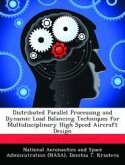Network-based parallel computing using personal computers is currently a popular choice for concurrent scientific computing. This work evaluates the capabilities and the performance of the AFIT Bimodal Cluster (ABC) - a heterogeneous cluster of PCs connected by switched fast Ethernet and using MPICH 1.1 for interprocess communication - for parallel digital signal processing using Space-Time Adaptive Processing (STAP) as the case study. The MITRE RT_STAP Benchmark version 1.1 is ported and executed on the ABC, as well as on a cluster of six Sun SPARC workstations connected by a Myrinet network (the AFIT NOW), and on a IBM SP for comparison. Modifications to the RT_STAP benchmark source code are done to accommodate the BLAS routines obtained from the ASCI Red project and the FFTPACK from the Netlib repository. Comparative performance analysis of the original and modified versions of the benchmarks executed on the ABC running the LINUX OS is performed, and shows improvements in the sustained Gflop/sec rates. Inter-platform comparative analysis demonstrates ABC's superior computation rates, but also reveals limited machine scalability as a result of severe communication overheads imposed by RT_STAP cornerturn operations. Analysis of experimental data indicates that ABC outperforms AFIT NOW but needs interconnection network improvements to be globally competitive to MPPs such as the IBM SP.
Bitte wählen Sie Ihr Anliegen aus.
Rechnungen
Retourenschein anfordern
Bestellstatus
Storno








